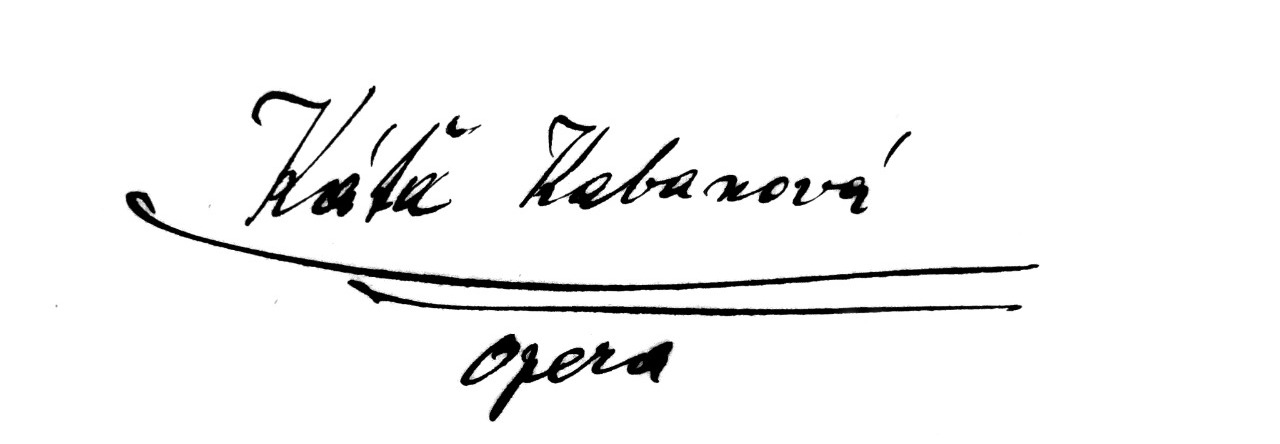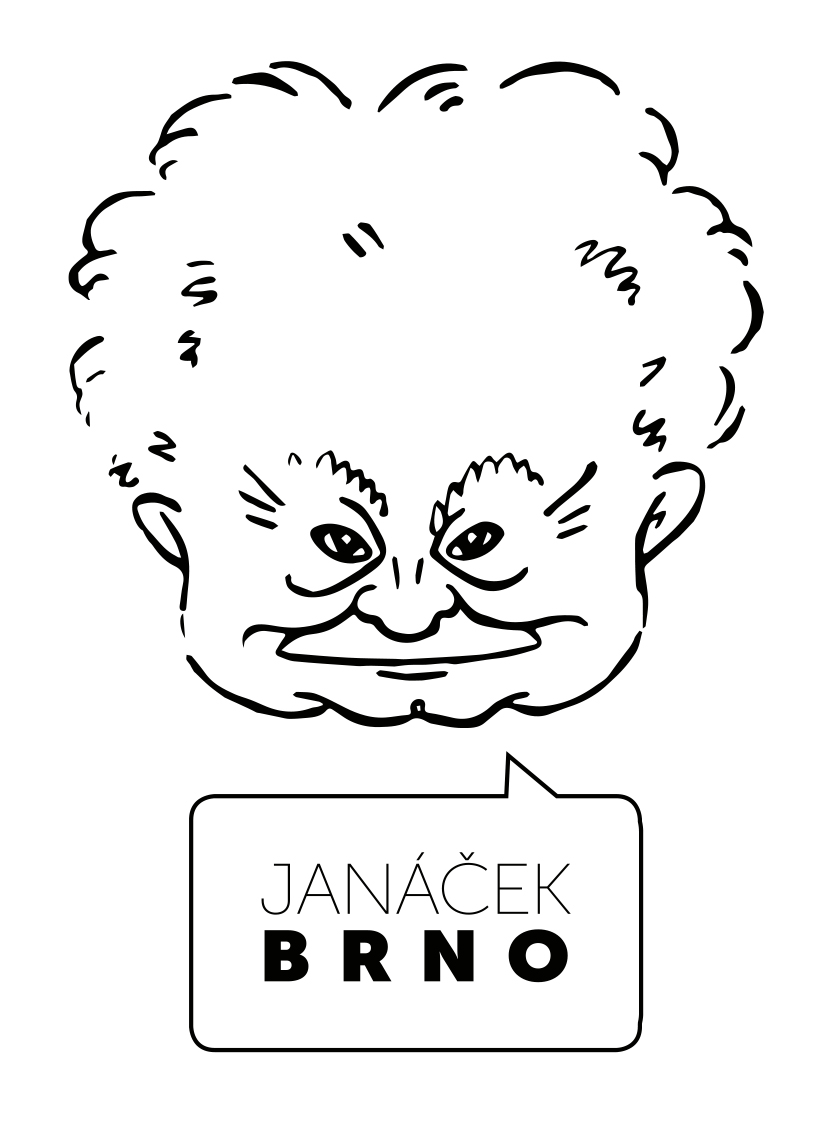
KÁŤA KABANOVÁ JW I/8
opera in three acts
libretto by Leoš Janáček after A. N. Ostrovsky's play The Thunderstorm (translation Vincenc Červinka)
1920-21, rev. 1927
premiere 23. 11. 1921 Brno
first edition Universal Edition, Vienna 1922 (full score and piano-vocal score), 1992, 1993 (full score and piano-vocal score, ed. Charles Mackerras, 1927 version)
Russian themes often appear in Janáček's work. This tragic play from tsarist Russia of the mid-19th century tells the story of a young woman who is driven to suicide by the hypocritical morality of society. With Káťa Kabanová, Janáček created one of his most lyrical works.
When in 1919 Janáček began thinking about the play The Thunderstorm as a subject for an opera, he was approaching his sixty-fifth birthday. His life had changed considerably over the previous three years; in 1916 he had finally managed to get Jenůfa performed at the National Theatre in Prague and two years later the opera was performed in Vienna, which was crucial for promoting the composer's work abroad. In Luhačovice in the summer of 1917 he met Kamila Stösslová, who became a close friend and inspiration for his later work. These events brought back joy and confidence to Janáček's life and led to the composer's unprecedented creative activity. Using a Czech translation of The Thunderstorm, Janáček wrote the libretto for the new opera himself, though he had trouble with the title. In a letter to the translator, Vincenc Červinka, from March 1921, Janáček wrote: "There are already several 'Storms' in music and opera compositions. So I wouldn't recommend this title. Neither is it a natural indicator of the main focus of the plot... Kateřina has the interesting psychological story. The director Schmoranz reminded me that it could be interpreted as Catherine II. He suggested Káťa, which Boris and Tichon call her. So I would lean towards calling it that. What is your opinion?" Červinka agreed but recommended adding the family name to make it obvious that it is related to Ostrovsky's subject. Thus came about the definitive title of Káťa Kabanová for the opera. The world premiere on 23. 11. 1921 at the National Theatre in Brno, conducted by the head of the Opera, František Neumann, was a huge success. One year later, Káťa Kabanová was also performed at the National Theatre in Prague under Otakar Ostrčil, and was followed by other national performances (Bratislava 1923, Ostrava 1924, Plzeň 1926). Soon afterwards, the opera also began to be given abroad (Cologne 1922, Berlin 1926). Janáček later added orchestral interludes between the individual scenes so that there was time for scenery changes without any interruptive pauses. In 1928 in Brno there was a new production of Káťa Kabanová for the opening of the Czechoslovak Exhibition of Contemporary Culture. We do not know Janáček's reaction to this production, but he was very put out by the lack of interest from the public. He noted on his wall calendar, "Káťa Kab. 'gala perfor. for the exhibition opening'. No committee, no ministers. Half empty." Janáček was also annoyed because of the gala concert and production of Jenůfa the following day,"'Gala concert', Sinfonietta . 56 people in the audience! No-one from the exhib. committee, no-one from the Co-operative. Jenůfa in the evening 'gala' - no-one in the boxes; no-one from the exhib. committee or the Co-operative." It was the last time that Janáček would hear his works in Brno. Not long afterwards he travelled to Luhačovice and then to Hukvaldy, where he died suddenly.
Opera synopsis
Act 1
In a public park the young teacher Kudrjáš is admiring the view of the expansive landscape and the River Volga. The afternoon tranquillity is disturbed by the approach of the angry merchant Dikoj and his nephew Boris. Kudrjáš wonders how Boris is able to put up with his uncle's rudeness, but he has no option if he wants to inherit property from his grandmother for himself and his sister. Added to his misfortune is his hopeless love for a married woman - Katěrina Kabanová, although Káťa is also unhappy in her marriage. She grew up in a loving family and now she lives with a weak husband and his despotic mother, Kabanicha. She instructs her son to go to the market in Kazan, and chides him for lacking filial love and obedience.
Scene change
Káťa and Varvara, a
foster-child in the Kabanov house, are sewing together and Káťa reminisces
about the happy days of her childhood. Káťa confesses that she was secretly in
love with Boris and the reckless Varvara offers to be a go-between. Tichon
comes to say goodbye to his wife before leaving for the market. Káťa begs him to
take her with him, or at least to pledge himself to her. Tichon doesn't
understand and refuses. Kabanicha sees their farewell and on her instruction
Tichon humiliates Káťa by admonishing her in an undignified manner.
Act 2
Kabanicha criticizes Káťa for not appearing sad enough at Tichon's departure. Varvara brings the key to the garden gate which she took from Kabanicha so that she could meet Kudrjáš. Káťa resists but finally takes the key. A half-drunk Dikoj comes to see Kabanicha, begging for her favour.
Scene change
Varvara meets Kudrjáš in a hollow behind the Kabanovs' garden. Varvara has also invited Boris to come. Káťa tries to overcome her desire for Boris, but finally succumbs and falls into his arms.
Act 3
A wild storm rages above the town. The people seek shelter in a ruined monastery. Kudrjáš uses the opportunity to try to persuade Dikoj to introduce lightning conductors to the town. Dikoj, however, sees the storm as a sign of God's anger and rejects Kudrjáš's interpretation with invective. Varvara looks for Boris. She tells them that ever since Tichon returned home, Káťa has been acting as though she has lost her senses. The Kabanovs also seek shelter in the ruined building. Terrified by the storm, in front of everyone Káťa confesses her affair with Boris. Kabanicha is triumphant. Tichon wants to forgive Káťa, but she flees.
Scene change
Tichon and others search in vain for Káťa. Varvara has decided to leave the family home and agrees with Kudrjáš to escape to Moscow. Káťa arrives at the banks of the Volga, where she realizes the only release from the unbearable life with the Kabonovs is death. First she wants to say goodbye to Boris. He comes to tell her that his uncle is sending him to look after the business in Siberia. Once he leaves, Káťa throws herself into the depths of the Volga.
